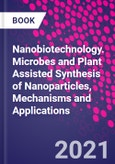Nanobiotechnology: Microbes and Plant Assisted Synthesis of Nanoparticles, Mechanisms and Applications covers in detail the green synthesis of nanostructures of tailor-made size, shape and physico-chemical and opto-electronic properties. The rationale behind the selection of bacteria, cyanobacteria, algae, fungi, virus and medicinal plants for the synthesis of biologically active exotic nanoparticles for biomedical applications is also part of this book. It also explores metal recovery, bioconversion, detoxification and removal of heavy metals using nanobiotechnology and discusses the potential of nanobiotechnology to address environmental pollution and toxicity. The book further covers the economic and commercial aspects of such green nanobiotechnology initiatives, its current status in intellectual property rights like patents filed so far globally, technology transfers, and market potential. This information enables one to decipher the scope of biogenic nanoparticles and its prospects.
Please Note: This is an On Demand product, delivery may take up to 11 working days after payment has been received.
Table of Contents
1. Nanobiotechnology: Methods, Applications and Future Prospects2. Characterization techniques for nanoparticles
3. Nanotheranostics and biocompatibility
4. Bacteriogenic silver nanoparticles: Mechanisms and applications
5. Bacteriogenic gold nanoparticles: Mechanisms and applications
6. Mycosynthesis of silver nanoparticles: Mechanism and applications
7. Mycosynthesis of gold nanoparticles: Mechanism and applications
8. Genetically modified microbes for nanbiotechnology
9. Viruses and nanotechnology
10. Algae assisted synthesis of nanoparticles
11. Phytogenic synthesis of silver nanoparticles: Mechanisms and applications
12. Phytogenic synthesis of gold nanoparticles: Mechanisms and applications
13. Biological synthesis of platinum, palladium, copper and zinc nanostructures
14. Biological synthesis of magnetic nanoparticles
15. Heavy metal removal by nanobiotechnology
16. Detoxification and bioconversion of arsenic and chromium
17. Nanobiotechnology for e-waste management
18. Metal recovery using nanobiotechnology
19. Functionalized biogenic nanoparticles and their applications
20. Patents, technology transfer, commercialization aspects of biogenic nanoparticles








